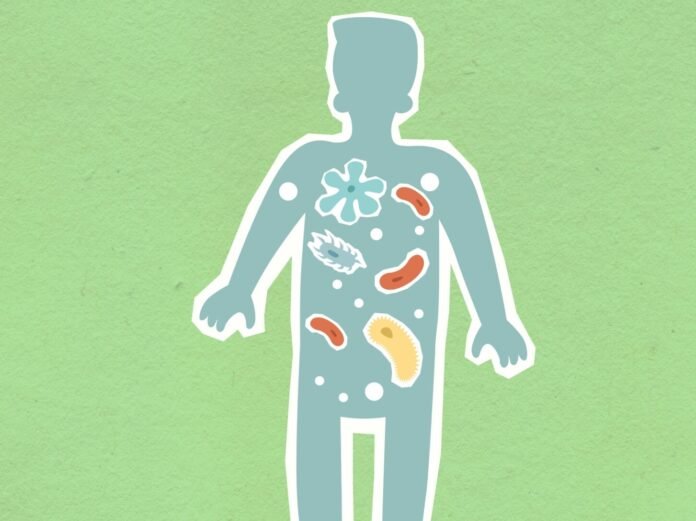The human microbiome is a complex internal ecosystem of microbes/bacteria located within the digestive system that we commonly call the gut.
The word “microbiome” is actually two words: “micro,” meaning small and “biome” is a habitat of living things. The human microbiome consists of 100 trillion symbiotic microbial cells buried in the gut of each person.
Our individual microbiome is our genetic footprint since it determines our unique DNA (hereditary factors).
The microbiome is different from other organs and has very far-reaching results tied to many different bodily functions.
About 90 percent of all diseases can be traced back to the gut and the health of the microbiome. These diverse organisms help govern nearly every function of the human body. The importance of our gut microbiome cannot be overstated: Poor gut health can contribute to autoimmune and many other disorders like arthritis, dementia, heart disease, and cancer.
Our health, fertility, and longevity depend on balancing good and bad bacteria in our gut.
We shape our own microbiome from what we eat; our bacteria adapt to environmental changes.
So, how can you improve your gut microbiome? Add probiotics to your diet by eating probiotic-rich foods or taking supplements such as Maz Mix.
These live microorganisms, when consumed, maintain or restore beneficial bacteria to the digestive tract. They are found naturally in fermented foods such as yogurt, kefir, kimchi, Maz Mix and sauerkraut.
The scientific community finally understands bacteria’s role in nurturing a robust immune system and keeping us healthy.
Bacteria are crucial for creating immunity and keeping our digestive systems working smoothly, hormone levels balanced, and our brains working properly.
Our diet plays a huge part in creating gut health, and supporting our microbiome’s good bacteria is paramount. There is a critical link between a person’s microbiome, digestion, body weight, and metabolism.
A healthy gut impacts how our body extracts nutrients from our food. The microbiome plays a vital role in obesity, and changes in bacterial strains in the gut have been shown to lead to significant changes in health and body weight. Gut bacteria influence hormone production, nutrient extraction and fat storage.
Foods that promote inflammation include:
- Chemical farm factory-raised meat, poultry and eggs are high in omega-6s due to feeding the animals corn, which is GMO and sprayed with Glyphosate negatively affecting their microbiomes, and then after we eat them, results in a plethora of serious illnesses
- Hydrogenated oils. (Trans fats) used in packaged and processed products and often used to fry foods
- Refined vegetable oils like canola, corn and soybean oils, which are high in proinflammatory omega-6 fatty acids
- Pasteurized dairy products produce common allergens
- Refined carbohydrates and processed grain products
- Sugars added in the majority of packaged snacks, bread, dressings, canned items, cereals, etc.
The solution: Try natural foods – they lower inflammation and help increase good bacteria in the gut. High-antioxidant foods reduce gut damage caused by oxidative stress.
Anti-inflammatory foods. The base of our diet should include:
Fresh organic or Mexican-grown vegetables are loaded with phytonutrients that lower cholesterol and reduce symptoms of rheumatoid arthritis, IBS, Alzheimer’s disease, cancer, cardiovascular disease and diabetes.
The best include beets, carrots, cruciferous vegetables (broccoli, cabbage, cauliflower); dark, leafy greens, kale, chayote, spinach; onions; peas; salad greens; sea vegetables and
squashes.
Fresh fruit contains antioxidants that are tied to cancer prevention and brain health. Enjoy apples, blackberries, blueberries, cherries, nectarines, oranges, pears, pink grapefruit, plums, pomegranates, and strawberries.
Herbs, spices and teas are great for your gut: turmeric, ginger, basil, oregano, thyme, etc., plus green tea and organic coffee.
Probiotics: Probiotic foods contain “good bacteria” that populate your gut and fight off bad bacterial strains. Include probiotic fermented foods like, kefir or cultured vegetables or try Maz-mix an organic multi-herb, multi-probiotic and pre-biotic, herbal fermentation formula,
high in vegetable protein also contains antioxidants, Omega 3, vitamin B complex, minerals like magnesium, iron, calcium and much more.
Wild-caught fish, cage-free eggs and grass-fed/pasture- raised meat: higher in omega 3, farm-raised foods are good sources of protein, healthy fats, and essential nutrients like
zinc, selenium, and B vitamins.
Healthy fats: grass-fed butter, coconut oil, extra virgin olive oil, nuts/seeds.
Ancient grains, legumes, and edible plants two to three servings per day: Eat Aztec plants and seeds from the family of Quelite like verdolaga (purslane), pumpkin, amaranth, quinoa, black beans, black-eyed peas, chickpeas, lentils, and black rice.
Red wine and dark chocolate/cocoa in moderation: a small amount daily.
If you have any comments or questions, contact me by email or find me at my office at the Cuale Island building in front of the Le Bistro Restaurant on Saturday from 10 am to 2 pm. or at Calle de la Merced #155B, Barrio Santa Maria, Thursdays from 11 am to 5 pm. Make an appointment or request more information at mexicasupplement@gmail.com.


